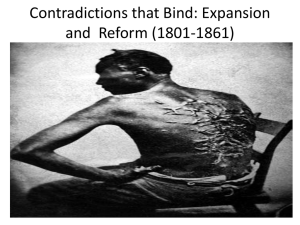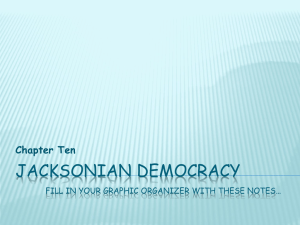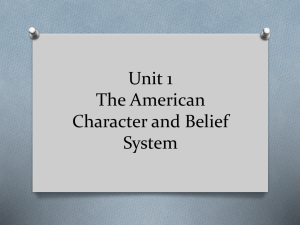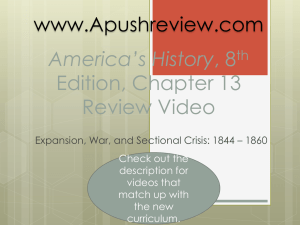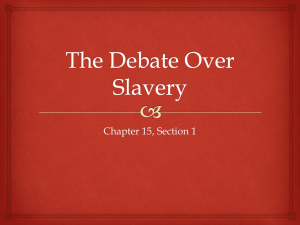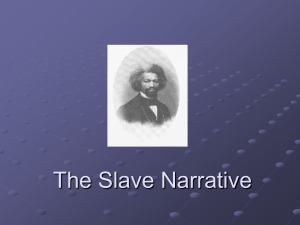APUSH Review, The Final Exam Review, 2014 Edition Part I
advertisement
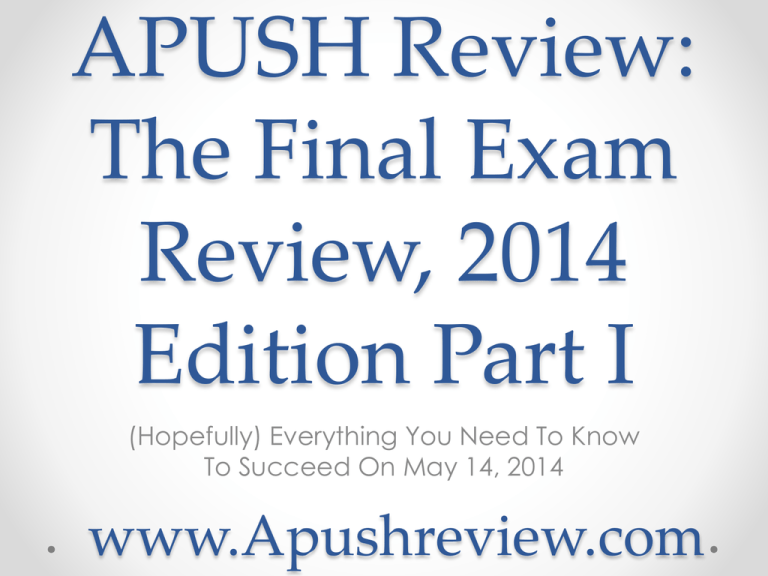
APUSH Review: The Final Exam Review, 2014 Edition Part I (Hopefully) Everything You Need To Know To Succeed On May 14, 2014 www.Apushreview.com Colonial America through 1776 • First people came to the Americas through the Bering Straight from Asia • European colonization o o o o Spanish tended to settle in Central and South America French settled in New France (Canada, Ohio Valley) Britain settled on the East coast (13 colonies) The French had the best relationship with Natives • Colonial Rebellions: o Bacon’s Rebellion (1676) – poor, landless whites rebelled against Governor Berkeley; upset with lack of protection from Native Americans • Led to an increase in slavery o Pueblo Revolt (1680) – Native American revolt against the Spanish in present day New Mexico o Stono Rebellion (1739) – Slaves killed many whites in SC, tried to flee to Spanish Florida Colonial America through 1776 Continued • British Colonies: • o Massachusetts Bay – established to be a model society, “City Upon a Hill” (John Winthrop) • White, land-owning, church members could vote; women had few rights • Were not religiously tolerant – Roger Williams and Anne Hutchinson challenged the clergy o Pennsylvania – founded by William Penn (Quaker) • Characteristics of Quakers: o Pacifists, women had more rights, religiously tolerant o Rhode Island – founded by Roger Williams • Religiously tolerant o VA (Jamestown) – tobacco improved the economy, but exhausted the land, joint stock company 1st Great Awakening: o John Edwards – founder of the G.A., “Sinners in the Hands of an Angry God” • Be able to recognize quotes – “God,” “Hell,” etc. o George Whitefield was a great orator • British Economic Policy: o Mercantilism: purpose of the colonies was to provide wealth for the mother country o Navigation Laws: enforced Mercantilism, colonies could only trade with Britain Colonial America through 1776 Continued • French and Indian (7 Years) War: o British and colonists v. French and Native Americans o DRASTICALLY ALTERED THE RELATIONSHIP BETWEEN THE BRITISH AND COLONISTS • 1763: o End of F&I War, End of Salutary Neglect, Pontiac’s Rebellions -> Proclamation Line of 1763 • Stamp Act: o Raise revenue for the British -> Stamp Act Congress, first attempt at colonial unity AGAINST the British • Declaratory, Townshend, Intolerable, and Tea Acts • “No taxation without representation” o Rejection of Britain’s theory of virtual representation • Common Sense: o Written by Thomas Paine, urged colonists to break away from England o Stated that KG3 was bad • Olive Branch Petition: o Last ditch effort by the colonists at peace; rejected by KG3 American Revolution Through the Constitution • Battle of Saratoga o Turning point in the war o France provides necessary aid to America • Women during the war: o Helped provide food, money, medicine, etc. • Treaty of Paris of 1783: o Ended the war, US gained all land east of Mississippi • Articles of Confederation: o Weak central government – could not tax, raise army, no executive branch • Shays’ Rebellion: o Massachusetts farmers rebelled -> showed the need for a new, strong government • Northwest Land Ordinance of 1787: o Outlawed slavery o Outlined how territories could become states (60,000 population) American Revolution Through the Constitution Cont. • Constitutional Convention: o Held in Philadelphia • Constitution Compromises to know: o Great (Connecticut) Compromise • Created a bicameral (2-house) legislature – one house based on population, one house equal representation • Helped settle issues over representation o 3/5 Compromise: • 3/5 slaves would count towards population for representation in the House • Federalist Papers: o Written by Jay, Hamilton, and Madison to gain support for the ratification of the Constitution • Bill of Rights: o Added to the Constitution to appease the Anti-federalists o Enough states ratify the Constitution • Washington – Adams Judiciary Act of 1789: o • Alexander Hamilton’s Financial Plan: o • 3 US diplomats (led by John Marshall) hoped to meet with French minister They were asked to pay $250,000 to meet with him, US refused Led to the Quasi War and…… Alien and Sedition Acts: o o o • Warned against foreign alliances Helped promote neutrality XYZ Affair: o o o • PA farmers protested the excise tax from Alexander Hamilton Washington and the military quickly crushed the rebellion Demonstrated the power of the new federal government under the Constitution Washington’s Farewell Address: o o • Purpose was to improve the economy (BUS, tariffs, and excise taxes) Whiskey Rebellion (1791): o o o • Creates the Supreme Court with 5 associate judges and 1 Chief Justice (John Jay) Purpose? • Federalists wanted to silence their opponents • Many Democratic Republicans supported the French Alien Act: • Made it more difficult for foreigners to become US citizens (5 to 14 year waiting requirement) Sedition Act: • Made it illegal to criticize the government (President Adams) VA and KY Resolutions o o KY (written anonymously by Jefferson – VP) VA (written by Madison) The Jeffersonian Era • The Election of 1800: o Peaceful transition of power from Federalists to Democratic-Republicans o o o New judges were created by outgoing Federalist Congress John Adams appoint many in his last few days “Midnight Judges” Led to…… o o Supreme Court declared part of the judiciary act of 1789 unconstitutional First time the Supreme Court declared a law unconstitutional o o Purchased from France, US wanted New Orleans Doubled the size of the US, Jefferson switched from a strict to loose interpretation o o o Cut of all trade between the US and other countries Huge disaster Helped start the Industrial Revolution (Jefferson favored an agrarian society) o o o Causes: impressment, British arming of Native Americans, war hawks, etc. US tried to gain Canada Produced two war heroes: • William Henry Harrison – The Battle of Tippecanoe • Andrew Jackson – The Battle of New Orleans o Helps propel Jackson to the presidency in 1828 Hartford Convention: • Grievance of several Federalists in N.E.; wanted to alter the Constitution -> helped lead to the demise of the Federalist Party • Judiciary Act of 1801: • Marbury v. Madison (1803): • LA Purchase (1803): • Embargo Act of 1807: • War of 1812: o The Era of Good Feelings • During James Monroe’s Presidency o 1816 – 1824 o Time of 1 political party (Democratic-Republicans) o Increase in nationalism • Henry Clay’s American System: o Favored 2nd BUS, Internal improvements, and a protective tariff (1816) • Missouri Compromise o Missouri applied for statehood, would upset balance of free and slave states o 3 part compromise: MO is a slave state, ME is a free state, 36°30’ latitude line: above is free, below is slave • The Monroe Doctrine: o o o o Written by Monroe’s Secretary of State John Quincy Adams Warned European countries to not recolonize Latin America In return, the US would stay out of European affairs Cornerstone of US foreign policy for decades The Jacksonian Era (1824 – 1840) • The “Corrupt Bargain” of 1824 o No electoral majority in the election of 1824, although Jackson got the most votes o Vote goes to Congress, Clay throws his support behind o Adams becomes president, names Clay his Secretary of State • “Common Man” o Increased voting rights for adult males, elimination of property requirements to vote • Tariff of Abominations (Tariff of 1828) o High tariff, disliked by the South and West o John C. Calhoun (sitting VP) wrote The South Carolina Exposition and Protest anonymously • Drew inspiration from the Virginia and Kentucky Resolutions • Tariff of 1832: o Lowered the tariff of 1828, but still too high for the South’s liking o Led to the…… • Nullification Crisis: o SC called a state convention, nullified the tariff of 1832 o Threatened to secede if tariffs were collected by force • Compromise Tariff of 1833: o Henry Clay! o Lowered the tariff rates by 10% per year for 8 years The Jacksonian Era (1824 – 1840) • Jackson and Native Americans o Indian Removal Act – purpose to move Natives west of the Mississippi o Worcester v. Georgia – Supreme Court ruled Natives did NOT have to move o Jackson did not enforce the Supreme Court’s decision • The Bank War: 1832: Clay proposes a 3rd BUS (the 2nd one would expire in 1836) Jackson vetoed the re-charter The 2nd BUS still had 4 years Jackson wanted to destroy the 2nd BUS, so he removed government funds and put them in state “pet” banks o Why did Jackson dislike the BUS? • He felt it benefitted the rich (elite) • Too much power was concentrated in the hands of few people (Biddle) o o o o • Texas: o Declared independence during Jackson’s presidency • He did not recognize independence of TX for fear of sectional tensions over slavery • Election of 1840: o William Henry Harrison (War of 1812 hero) v. MVB o Incredibly high voter turnout o Slogans used in the election: “Log cabins and hard cider,” “Tippecanoe and Tyler Too” Manifest Destiny (1840s – 1850s • What is it? o Coined by John Sullivan, America’s God-given right to expand from coast to coast • Mexican-American War: o Polk claimed Americans were attacked on American soil o Thoreau: On Civil Disobedience – refused to pay a poll tax he believed would fund the war o Wilmot Proviso: proposal in Congress to ban slavery from ALL territory gained from Mexican Cession; never passed (failed in the Senate, passed in the House) o Treaty of Guadalupe Hidalgo: • Ended the war; US gained the Mexican Cession, increased size by 1/3 • Compromise of 1850: o o o o o o Helped settle dispute over the land gained from the war Popular sovereignty in the Mexican Cession Tough fugitive slave law – turned many in the North to the abolitionist cause Abolished the slave trade in D.C. California was admitted as a free state (balance in favor of free states) Texas was paid $ to settle a boundary dispute • Gadsden Purchase: o US continental expansion is complete o Watch JIMMY FALLON! Antebellum Reform Movements • 2nd Great Awakening: o “Burned-over district” of WNY – many religious conversions o Belief in perfectionism sought many to reform society • Key reform movements: o o o o o Abolitionist Movement: abolish slavery Temperance – sought to eliminate alcohol Women’s rights – Seneca Falls Convention Education – Horace Mann Treatment for mentally ill – Dorothea Dix Women played a large role • Notable Religions: o Mormons – fled to Utah o Shakers – Mother Ann Lee • Transcendentalism: o Movement to find one’s “inner self” o Henry David Thoreau – Walden – lived in isolation for two years o Ralph Waldo Emerson – Self Reliance • Nativism: o o “Old” Immigration What is it? • Fear, distrust, and hatred of foreigners Reasons for nativism: • Different cultures, Different languages, Religion • Irish and Germans “stole” elections o Tended to vote Democratic, Tammany Hall – NYC • Immigrants “took” jobs o Work for less money, would not unionize • Know – Nothing Party o o What is it? • Political party formed due to nativism Originated as the Supreme Order of the Star-Spangled Banner • Wanted to ban Catholics from holding offices • Called for tougher immigration and naturalization laws • What is it? “Old” Immigration o Immigrants that came from Northern and Western Europe o Ireland (Potato Famine!), Germany, England o 1820s – 1870s o Irish • Specific countries? • When did it occur? • What group made up the largest prior to the Civil War? Slavery • Slave Life: o Long hours, arduous work o The further South, the more slaves and harder the work o Slave Codes: • Laws to regulate slave life – couldn’t read/write o A unique culture developed • Combination of African and American cultures; religion; extended families • Rebellions To Know: o Denmark Vesey: • Planned the largest ever revolt, did not occur o Nat Turner: (VA) • 60 whites and 100 blacks were killed • Coincided with Garrison’s Liberator • Helped silence abolitionist movement in VA, more strict laws o Although rebellions did happen, the most common form of resistance was running away, faking sickness, working slowly, and/or breaking tools • Gag Resolution: o Prohibited anti-slavery petitions in the House of Representative o Eventually overturned with the help of John Quincy Adams Slavery Continued • Fugitive Slave Law (1850) o o o o Part of the Compromise of 1850 Much tougher law Many in the North joined the abolitionist movement Many states passed Personal Liberty Laws • Essentially, it’s nullification • Abolitionist Writings: o The Liberator o Uncle Tom’s Cabin • Abolitionists you must know: o o o o o o American Colonization Society William Lloyd Garrison – The Liberator Frederick Douglass – The North Star Harriet Beecher Stowe – Uncle Tom’s Cabin Harriet Tubman – Underground Railroad John Brown – Harpers Ferry • Free – Soil Party: o Against the spread of slavery into western territories • George Fitzhugh: o Argued that northern workers were worse off than slaves The Road to the Civil War • Kansas – Nebraska Act (1854): o Stephen Douglas proposed allowing popular sovereignty in Kansas and Nebraska o Problem? Both were above the 36°30’ Missouri Compromise Line • KS-NB overturned the MO Compromise o Voting in Kansas (expectation was that it would join as a slave state) turned bloody o Caning of Charles Sumner o Helped inspire the Republican Party • Their platform would be to stop the spread of slavery • Dred Scott v. Sanford (1857): o o o o Supreme Court declared African Americans were NOT citizens Slavery is constitutional Congress had no right to legislate slavery Northerners were upset, Democratic Party splits along sectional lines • Harpers Ferry: o Planned uprising led by John Brown; failure o Many Southerners believed there would be more “John Browns” • Associated the Republican Party with John Brown • Election of 1860: The Civil War o Lincoln wins the election • Immediate cause of the Civil War • Lincoln campaigned on the NONEXTENSION OF SLAVERY, NOT TO ELIMINATE SLAVERY • The War: o Conscription: • Draft (forced enlistment) o Substitutes could be hired for people that were drafted o NYC Draft Riots (1863) “Rich man’s war, poor man’s fight” • 100s of people were killed o Contraband: • Escaped slaves that crossed over into the Union • Worked at camps and fought in the war o Border states? • Slave states that did NOT secede during the Civil War • Many fought on BEHALF of the Union. • Battle of Antietam: o North won, led Lincoln to issue the Emancipation Proclamation; kept Europe out of war • Habeas Corpus: o Cannot be held in jail without having charges brought against you o Lincoln suspended Habeas Corpus • Only Congress can suspend Miscellaneous Pre-Civil War Stuff • Key ideas for women: o Republican Motherhood: (Post Rev. War) • Belief that women should raise children to be good citizens o Cult of Domesticity: • Women had “separate spheres” than men • Helped reinforce different roles for men and women • Hudson River School: o Painted landscapes/environment • John Marshall and the Supreme Court: o Tended to favor the federal government over states and promote business • Daniel Webster’s Second Reply to Hayne: o Debate in Congress over sectionalism, Webster promoted national unity Thanks for watching! Subscribe to my channel Help spread the word • Questions? Comments? Ideas for videos? o Leave in comments Good luck in May!
